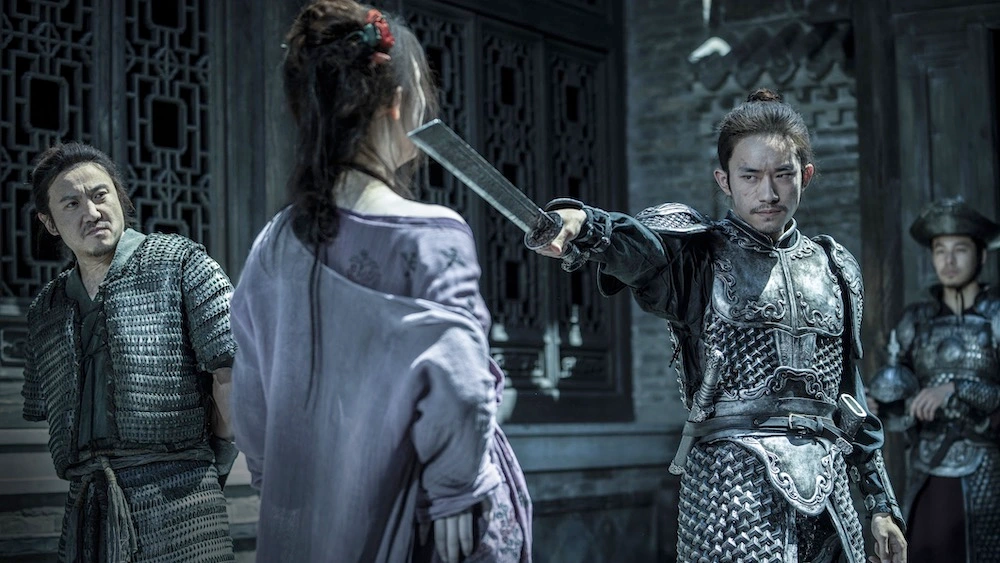Zhang Yimou’s newest film– his 25th feature film depending, on what you count*– opens with one of the great shots of his career: a one or two-minute bird’s eye view oner tracking a group of Song dynasty soldiers in 1146 CE running through an maze-like corridor on a royal military compound, occasionally shielded by perfectly architecturally placed triangle roofs that vertically bridge across the horizontal corridor the soldiers are marching through. Colored muted blue and grey, the shot lowers and follows the soldiers closer as their panic is now shielded from the camera by a decorative fence. Even by Zhang’s standards, one of the great cinematographic eyes working today, it’s something special.
Which makes the comedy that almost immediately follows all the more fascinating. It’s not his first comedy– that would be A Woman, a Gun, and a Noodle Shop (2009, a remake of the Coen Brothers’ 1984 film Blood Simple)– but I didn’t expect a funny film to follow such a manic and kinetic opening. Funny as it is, I’m also not sure it is a comedy…strictly speaking. The jokes recede as the mystery at the film’s center unravels, and, a little over halfway, Full River Red certainly feels more like the film the opening promised: a serious, political who-dunnit.
Set four years after the death of national hero General Yue Fei—the author of the poem with the same name as the film known by virtually every child in China, (at least, that’s the claim by the filmmakers)—a rival Jin dynasty envoy is murdered while visiting Grand Chancellor Qin Hui (Lei Jiayin) and a very important letter disappears with the victim. The low-ranking soldier Zhang Da (comedian and actor Shen Teng) and his younger but higher-ranking uncle Sun Jun (pop star Jackson Yee) are given two hours to find and return the letter to the chancellor. Within those two hours and an additional 30 or so minutes, the film plays out effectively, though not actually in real-time. To meet such hectic demands, Zhang (both Da and Yimou, I suppose) is relentless: moving from one piece of the puzzle to the next, from one interior set to the next, from one throat slit to the next.
I mean this in the best way possible: this is one of the most original and boldest mainstream films I’ve ever seen. The directorial choices, beginning with Han Hong’s time-bending score, are without filter, constriction, or hesitance. Han, a Tibetan-Han (Han is half Han…it’s a bit confusing, I suppose) female singer, combines folkloric and techno Hip Hop notes with uber-modern punk rock singing. For real, I don’t know how else to describe this. Her yelling lends the film some of the seriousness it requires after the comedic start. And it’s as bold as anything I’ve heard in a long time, and I love it for that. Even without understanding the lyrics, I can’t imagine hearing a more confident score from a new release this year.
I’d be a poor critic if I didn’t mention the film’s insidious propagandistic purpose. In the film’s spectacular finale, the recitation of the titular poem is shot with the same seriousness as the final minutes of a Super Bowl. And like any significant sporting event or a good war film climax, the scene emanates from its kinetic direction. Held with a knife to his back, Chancellor Qin Hui reads the poem of Yue, his former political enemy, to the army guarding his abode. With each new line, a series of messengers run from their position to that of the next messenger shouting the line to be recited, until finally, the line reaches what I assume to be a battalion of soldiers composing the majority of the standing Song dynastic army. The moment is perfect cinema.
Critically, the poem is rather disgustingly nationalistic, proclaiming the drinking of the blood of the enemy (no worse than the French National Anthem, to be sure) and the re-conquering of “the last lands.” The latter makes it difficult not to think of Taiwan, Hong Kong, and to an extent Tibet, especially given the film’s anachronistic score that serves as a bridge to the current geopolitical environment.
As propaganda filmmaking, this is the best I’ve ever seen. And at $671.4 million and as the most profitable film of Zhang’s lustrous career (Hero, House of Flying Daggers, The Great Wall, etc..), it’s safe to say the film appears to be resonating with the Chinese audience. Hell, I still loved it.
*In my research for this review, I stumbled across something I’m not sure even the biggest Zhang Yimou fans are aware of: Zhang, the great Chinese director, also shares a director credit on a Christmas special of VeggieTales.
Full River Red
2023
dir. Zhang Yimou
157 min.
Now playing at AMC Boston Common


